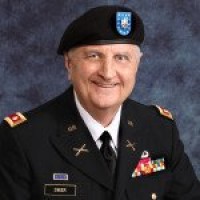Veteran Gets Citizen Watchdog Award

In the spirit of service, we’d like to recognize a veteran whose service to his fellow citizens didn’t stop when he retired from the Army as a Lieutenant Colonel. You may be familiar with the work of Dr. Richard Swier, the state editor of Watchdog Wire-Florida, whose story on a college professor handing out Obama campaign materials made national headlines last fall.
From Watchdog Wire by Andrew Collins:
Last September, when the 2012 presidential campaigns had reached full force, an email popped up in Richard Swier’s inbox. It was from the uncle of a student at the nearby Brevard Community College in Melbourne, Florida. Attached was a scanned image of a pledge to vote for Barack Obama. Students had allegedly been forced to sign the pledge in a mathematics class taught by Professor Sharon Sweet. Having taught at the university level himself, Swier knew that if the tip were true, this teacher had crossed lines. Something had to be done.
Swier immediately checked the school website to confirm the facts. There was indeed a Prof. Sweet who taught math. He contacted the school and asked them about the pledge. Officials told him that there had been complaints from Prof. Sweet’s class and that they had started an investigation, so he ran the story in Watchdog Wire-Florida with the headline: “’Vote for Obama’ pledge Prof. Under Investigation.”
Shortly after, the Drudge Report picked up the story, then Fox Radio  News, and after that Megyn Kelly, who added some journalistic work of her own. The story had gone viral, rocketing up into the spotlight of the national media and spreading organically through shares and word of mouth. It racked up 25,000 “likes” and received more than 50,000 website hits when all was said and done.
News, and after that Megyn Kelly, who added some journalistic work of her own. The story had gone viral, rocketing up into the spotlight of the national media and spreading organically through shares and word of mouth. It racked up 25,000 “likes” and received more than 50,000 website hits when all was said and done.
Six months later, Brevard Community College announced that it had fired Prof. Sweet.
Once Upon A Blog
It all started at Christmastime eight years ago, when Swier’s son told him about a company called Google. The rapidly growing Internet giant was offering free web space on which individuals could create a platform called a weblog, now commonly referred to as a blog. He took to it immediately, using blogging as the megaphone through which he could broadcast his views on the events and issues of the day.
He was soon picked up by Red County, a local conservative online news outlet, and became one of the sites’ top contributors. After the site went belly-up several years ago, Swier encountered Erik Telford from The Franklin Center at a grassroots conference in Orlando. Telford, who was gearing up to launch the Watchdog Wire sites at the time, saw the window of opportunity. Immediately he brought on Swier to edit and populate the Florida site. “Now that we’re flying high,” Telford said, “we need to build the airplane.” Swier helped him do just that, making Florida the first of the Watchdog Wire sites to launch in June of 2012.
Since then, he says, they’ve continued building the airplane, learning how to make it fly higher.
A Healthy Skepticism
Swier credits much of his journalist chops to a background that includes military service, starting up tech businesses, and a doctorate in education from the University of Southern California. He particularly credits graduate school, which honed his writing through many long papers, and his time in the Army.
“My military background makes me skeptical of anything that’s said or done,” he says, which is key to any journalistic enterprise. “You hear two sides of a story and you always know the truth is somewhere in the middle.” The harsh efficiency of Army service—more than two decades that saw him rise all the way up to Lieutenant Colonel—also sharpened his research skills and developed a knack for cutting to the chase with clarity and simplicity.
As state editor of Watchdog Wire Florida, Swier has assembled a formidable team of contributors—a score strong and counting—ranging from established figures like former Congressman Allen West and American Enterprise Institute scholar Ed Pinto to everyday citizen journalists. With a little time and proverbial elbow grease, he has built a substantial network of local sources and writers in government and in the community who regularly send leads his way. Together, Watchdog Wire Florida tackles everything from local controversies over traffic light cameras to breaking news on national figures like Senator Marco Rubio.
The Wild West of Journalism
Swier finds his passion for journalism in the thrill of the chase. His favorite story, he says, “is the one I’m going to write tomorrow.”
“I always look towards the next big story. If it emotionally stirs me, if it really touches me in some way…then I love to write those kind of stories.” Above all else, he stresses that it must come from the heart. It requires belief, passion, and emotion on the part of the storyteller.
“If you just write mechanically you’re not a journalist anymore, you’ve lost it,” he says, “You’re in a news factory, and that’s why I like Watchdog Wire. It’s sort of like the Wild West.”
Indeed, that same drive to conquer the frontier pushes Swier to sit down at his computer in the morning and tell the stories that legacy media won’t. Despite all of his experience writing, researching, finding sources, and reporting news, he knows he could never work in a regular newspaper.
“It’d be too restrictive.”
On the contrary, Swier believes the news should be about freedom of expression, and he’s always looking for new ways to push the envelope. He operates under the maxim that “It’s better to ask forgiveness than permission,” but balances that with the responsibility of Watchdog’s reporting philosophy: “If your mother says she loves you, double check your source.”
The result is punchy yet accurate reporting geared to inflame readers’ passion. As Swier looks back at the scope of his work, he realizes that the citizen journalism of Watchdog Wire has the greatest impact when it engages and challenges people to understand what’s going on in their communities
“If I can educate enough people on topics that they probably aren’t paying attention to, and do it in a short, quick, enjoyable way…if I can tell a story and I can energize them, that’s the most important thing.”
Fearless
 For aspiring citizen journalists, he has three words of advice: “Don’t be afraid.”
For aspiring citizen journalists, he has three words of advice: “Don’t be afraid.”
“The biggest obstacle,” he says, “is that people are afraid to actually write something and see it published. They’re afraid that they won’t get it right and people won’t like it.”
“But they shouldn’t be afraid,” he adds. Like Nike says,“Just do it.” Not only does it provide an outlet to vent frustrations and share in the frustrations of others, it makes a difference. It changes people.
After all, Swier reminds us, it was citizen journalists – the “pamphleteers” – who ignited the American Revolution. Political bloggers and journalists like those at Watchdog Wire continue the American tradition of the pamphleteers today. “When the media’s not talking about it, and not reporting on it accurately,” he says, “you’ll always have the pamphleteers.”
The need for citizen-driven news is there. It always has been. And it doesn’t need to be complicated:
“Pick up your local newspaper, and write what they’re not writing about, or write what they are writing about and give the other side of the story, and you will be fine. You will succeed,” he says.
“People are dying for that—the other side of the story.”
Help Make A Difference By Sharing These Articles On Facebook, Twitter And Elsewhere:
